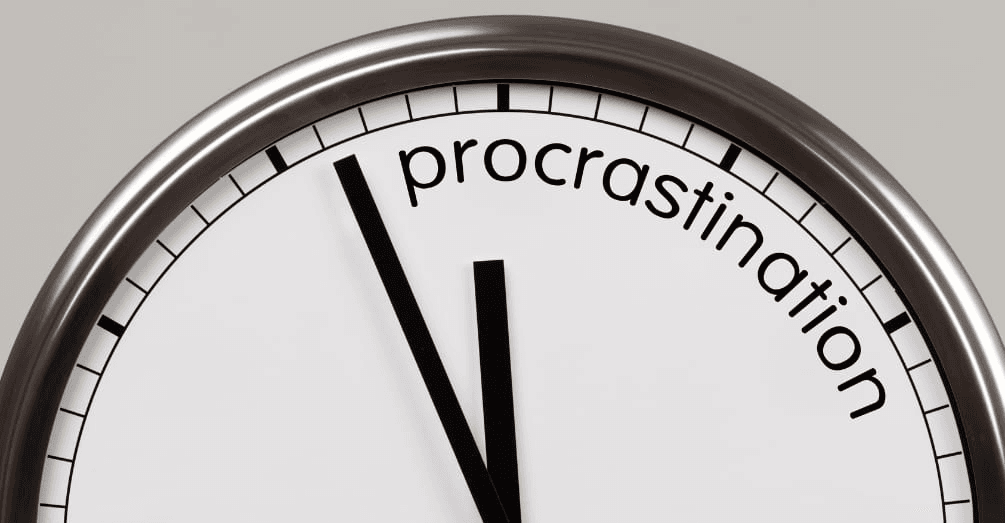Procrastination Psychology: Understanding Effects, Causes, and Solutions

In an age of endless distractions— Instagram, TikTok, YouTube, and even Google— it can be easy to blame the internet as the main cause of procrastination today. Contrary to what you might expect, procrastination is not a product of social media, but rather a habit of ‘habitual hesitation’ that has plagued humans since the beginning of time.
As early as 700 BC, the ancient Greek poet Hesiod warned against procrastination: “Do not put your work off till tomorrow and the day after… a man who puts off work is always at hand-grips with ruin.” Like the Greeks, the Romans also had a fervent hatred for procrastination and wrote about it often. Fast-forward two thousand years, and the English poet Geoffrey Chaucer writes about “the goodness you may do this day…and delay it not until the morrow” in his magnum opus, The Canterbury Tales.
The ancient Greeks and poets of medieval England have more in common with 21st-century university students and young professionals than we may think—they all struggle with the habit of delaying or putting off tasks until the last minute.
Current increased empirical interest shows that this ancient hatred of hesitation was not an irrational grudge, but rather a justified opinion that is now confirmed by science. In the past twenty years, thanks to a rekindled interest in humanity’s ancient nemesis, numerous studies show that procrastination can be a destructive force in many lives, particularly on mental health.
What is procrastination?
The word procrastination comes from the Latin procrastinare: “deferred until tomorrow” and the Greek akrasia: “acting against one’s better judgment.” The word itself suggests that procrastination is an active process: you choose to do something other than the task at hand, despite knowing that its delay will cause you to suffer in the future.
Procrastination can vary from chronic (perpetual problems finishing tasks) to situational (the delaying of tasks that may seem unattractive or boring). At some point in our lives, nearly everyone has delayed completing a task, with a number of studies showing that “procrastination appears to go hand-in-hand with the human condition.” Numbers are particularly high among students, with 80-95% of this group being estimated to engage in procrastination.
Dr. Joseph Ferrari, professor of psychology at DePaul University and a leading voice in the study of procrastination, says that a true procrastinator “has twelve things to do, maybe does one or two of them, then rewrites the list, shuffles it around, then makes an extra copy of it. That’s procrastinating.”
Procrastinators often seek “ephemeral pleasures” such as watching a TV show or spending time with friends instead of working on an important task. This type of procrastination is easy to identify. However, procrastination may take a more subtle form, disguised as the pursuit of “ephemeral chores.” If you have ever convinced yourself that organizing your spice cabinet or color-coding your agenda is more important than starting a task, you may employ this form of procrastination disguised as productivity.
The harmful effects of procrastination
Contrary to popular belief, procrastination is not caused by poor time management or a fear of failure. Rather, studies show that procrastination is due to self-regulation failure and a poor ability to manage emotions. Procrastinators recognize the harmful effects of putting tasks off, but can’t overcome the emotional urge of a diversion.
When discussing procrastination, Roman emperor Marcus Aurelius reminded himself to “stop letting your emotions override what your mind tells you,” suggesting that the Romans had insight into the causes of procrastination that psychologists are studying today. According to Dr. Timothy Pychyl, author of Solving the Procrastination Puzzle, “emotional regulation is the real story around procrastination because, to the extent that I can deal with my emotions, I can stay on task.”
The link between procrastination and struggles with self-regulation can play a role in substance abuse disorders or impulse control, suggesting that missing a deadline or rushing to finish a task can have more severe consequences than a bad grade or poor performance at work. The poor emotional regulation that comes with a tendency to procrastinate can also lead to a higher likelihood of developing mood disorders such as depression, anxiety, and even bipolar disorder.
Choosing short-term rewards over long-term benefits
Several studies have linked procrastination to depression, anxiety, low self-esteem, and overall poor mental health. One of the earliest studies to investigate the negative effects of procrastination followed a group of students throughout the course of a semester in 1997. Students who engaged in procrastination experienced less stress at the beginning of the semester, but their bliss was short-lived. By the end of the semester, the procrastinators not only earned lower grades than other students but also reported significantly higher stress levels and cases of illness, suggesting that procrastination had an influence not only on their performance but on their overall well-being.
When it comes to the link between procrastination and mental health conditions, it can be hard to identify which came first. The decreased energy, negative thoughts, and low self-esteem that come with depression can lead us to believe we cannot carry out the task at hand. In turn, putting off important tasks can increase our stress levels, decrease our self-worth and lead to elevated levels of anxiety and a higher likelihood of depression. A 2017 study found that the way participants felt influenced how and when they approached a task. Similarly, in research settings, people who procrastinate have higher levels of stress and lower well-being.
Don’t delay: take care of your mental health today
Due to the complicated underlying causes that lead us to procrastinate, telling a procrastinator to “just do it” can be as counterproductive as telling a person who suffers from depression to “cheer up.”
Training your mind and body to prioritize important tasks may be difficult, but the long-term benefits can not only improve your professional and academic performance but also improve your mental health and overall well-being.
3 tips to help you procrastinate less
Change the narrative
Due to the reciprocal nature of the link between mental health and procrastination, approaching tasks with a more positive outlook can trick your brain into prioritizing them instead of dreading them. Instead of seeing tasks as something you have to do, reframe them from a more positive point of view.
Instead, try:
“I can’t wait to show off my writing skills in this paper”
“Studying this topic is going to set me up for success in my career”
“This project is a great chance to showcase my analytical skills to my manager”
Practice self-compassion
A 2012 study that looked at the links between procrastination, stress, and self-compassion found that lower levels of self-compassion can lead to higher stress levels and a greater tendency to procrastinate. Lower self-esteem reduces our confidence in completing a task, leading our bodies and minds to opt for the short-lived pleasure of avoidance, instead of the long-term reward of overcoming a task.
Ways to increase self-esteem and practice self-compassion can include the following:
Forgive yourself for your mistakes
Take care of your body and mind with a healthy diet and exercise
Be kind to yourself
Acknowledge your strengths
Recognize your weaknesses not as shortcomings, but as opportunities for improvement
Create a reward system
Our tendency to procrastinate is intrinsically connected with the regulation of our emotions. When we procrastinate, we often choose immediate pleasure over long-term reward. By creating a reward system, you can train your mind to associate accomplishing difficult tasks with positive emotions.
Try rewarding yourself with a refreshing walk after completing half of the day’s tasks (just remember to get back on track) or spend time with friends getting coffee once you complete a hard assignment.

